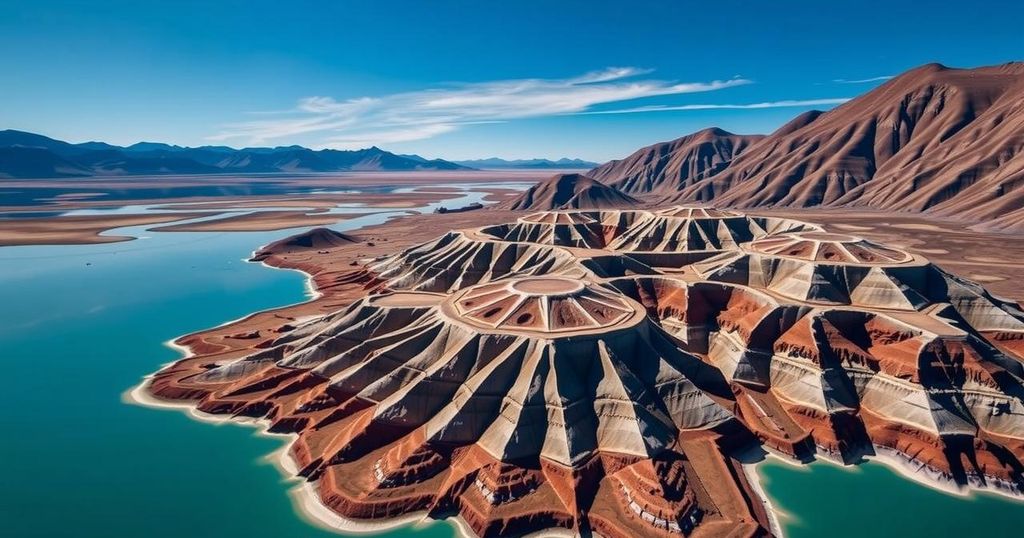Bolivia Secures $1 Billion Lithium Agreement with China’s CBC, Eyes Global Market Leadership
Bolivia has signed a $1 billion agreement with China’s CBC to establish two lithium carbonate plants in the Uyuni salt flats, aiming to enhance its role in the global lithium market. The plants will utilize advanced direct lithium extraction technology and are expected to produce 35,000 metric tonnes annually, with Bolivia retaining a 51% stake. However, political and logistical challenges, including parliamentary approval, may impede progress as elections approach in 2025.
Bolivia has recently forged a significant partnership, entering into a $1 billion agreement with China’s Contemporary Amperex Technology Co., Limited (CATL), specifically through its subsidiary CBC, to construct two lithium carbonate processing plants in the Uyuni salt flats. This strategic initiative, announced on November 26, aims to position Bolivia as a key player in the global lithium market, a sector in which it has historically encountered difficulties in fully harnessing its extensive resources.
The two facilities are projected to generate a combined output of 35,000 metric tonnes of lithium annually, employing cutting-edge direct lithium extraction (DLE) technology for enhanced efficiency and environmental sustainability. Furthermore, Bolivia’s state-owned company, YLB, will retain a controlling interest with a 51% stake in the project, allowing the nation to maintain oversight of its lithium resources.
President Luis Arce has hailed this agreement as a pivotal moment in Bolivia’s quest to emerge as a prominent global lithium supplier, underscoring its potential impact on international lithium pricing dynamics. Nonetheless, this ambition is tempered by numerous political and logistical hurdles, including the necessity for parliamentary approval. Given Bolivia’s fragmented legislature and the approaching 2025 elections, the pace of legislative processes may face considerable delays.
This latest development follows an earlier deal valued at $976 million between Bolivia and Russia’s Uranium One Group, a subsidiary of Rosatom, which also aims to implement DLE technology for the production of 14,000 tonnes of lithium yearly. Both CBC and Uranium One were previously authorized to establish pilot DLE plants in Bolivia, with future expansion plans to conventional industrial operations.
While these foreign investments are pivotal in financing and advancing technology, there exists an inherent risk of Bolivia becoming overly dependent on China and Russia. This reliance may constrain Bolivia’s long-term economic autonomy and leverage over its resources, possibly resulting in unfavourable contractual obligations and diminishing local benefits. The country’s control over its lithium sector could be compromised, potentially jeopardizing its strategic economic interests.
Despite possessing the largest lithium reserves globally, estimated at 23 million tonnes, Bolivia has not matched the production levels of its South American counterparts, Chile and Argentina. Factors such as inadequate infrastructure, complex regulatory frameworks, and persistent political instability have hindered the nation’s progress, fueling investor skepticism.
Since the 1990s, Bolivia’s efforts to cultivate its lithium industry have been beset by bureaucratic obstacles and logistical difficulties. Moving forward will require navigating complex environmental regulations and obtaining legislative approvals, a challenge compounded by the current political climate and the looming elections in 2025.
Bolivia, holding the largest lithium reserves in the world, faces considerable challenges in leveraging these resources for economic benefit. Historical difficulties in the lithium sector stem from insufficient infrastructure, regulatory complexities, and political instability. Recent agreements with foreign powers like China and Russia aim to bridge this gap by providing both investment capital and advanced technology. However, reliance on external entities raises concerns about national autonomy and the long-term implications for Bolivia’s control over its natural resources.
The recent $1 billion agreement between Bolivia and CBC represents a significant step forward in the nation’s lithium industry amidst historical challenges. While the partnership with foreign entities like China and Russia may provide vital resources and technology, it poses risks to Bolivia’s autonomy over its lithium sector. The upcoming political landscape and logistical hurdles will be critical in determining the success of this ambitious initiative and the country’s ability to capitalize on its vast lithium reserves.
Original Source: www.intellinews.com




Post Comment